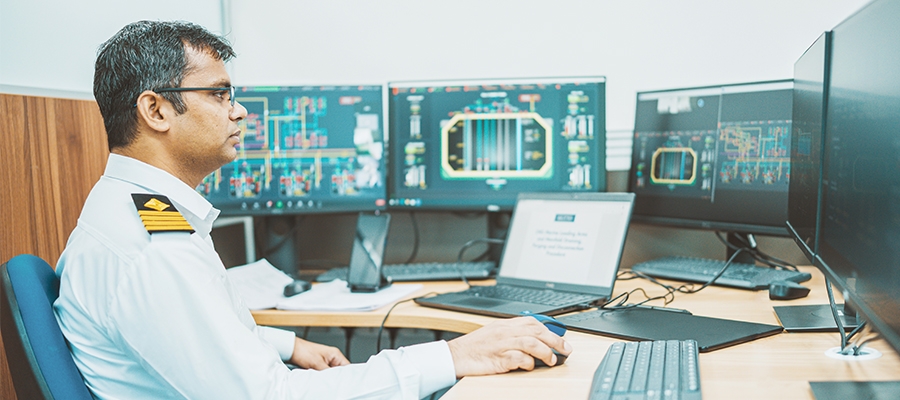
“FuelEU Maritime is a monster”
Ian Beveridge, CEO of the Schulte Group, shares his thoughts on the challenges posed by the new decarbonisation regulations. In his view, the key lies in finding solutions to the inherent complexity.
BSM invests a lot to sensitise and train its employees on FuelEU Maritime, EU ETS, CII and other relevant regulations. Because only those who understand these complex requirements will be able to implement them correctly and contribute to the decarbonisation of shipping.
Published on 12 Nov 2024

“If you look at FuelEU Maritime alone, we have organised numerous webinars and information events to train and support our fleet teams. Ultimately, they are the contact to the owners and must be able to guide and advise them about best possible solutions”, said Anil Jacob, Head of Fleet Performance and responsible for BSM’s Emission Management Services.
In parallel, BSM is preparing the seafaring staff for the new FuelEU requirements as part of its Vessel Performance and Decarbonisation (VPD) Courses. “We are the only ship manager where VPD Courses are mandatory”, Jacob points out. “We have already trained about 4,000 seafarers in 100 batches in our Maritime Training Centres. He is keen on raising awareness for the new regulations such as CII, EU ETS and FuelEU Maritime. “Ultimately, it is about fuel saving, and that is done on board.”
VPD Courses are crucial in advancing vessel performance and supporting decarbonisation efforts. Tailored for Masters, Chief Engineers, and 2nd Officers, the programme offers in-depth training on IMO and EU regulatory compliance, Live Voyage and Performance PAL tools, along with practical exercises focused on enhancing reporting quality.
Vessels staffed by seafarers who have completed the VPD training have demonstrated notable improvements in reporting accuracy and performance monitoring. This success is reflected in a significant enhancement of the Vessel Performance Rating (VPR) across the BSM-managed fleet.
The training is well received by the seafarers. “The course was incredibly helpful in comprehending all aspects and the importance of VPD. We gained in-depth knowledge of KPI indicators, fuel optimisation for the main and auxiliary engines, and techniques for performance enhancement and hull cleaning. The updates on new regulations were crucial, and we also appreciated the functions of PAL, which were previously underutilised but have now become integral to our operations”, said one of the course participants.
E-mail the expert
Ian Beveridge, CEO of the Schulte Group, shares his thoughts on the challenges posed by the new decarbonisation regulations. In his view, the key lies in finding solutions to the inherent complexity.
The countdown for FuelEU Maritime is on. It will come into force from 2025. BSM has already reached important milestones to serve its customers with effective and reliable compliance and emission management services.
12 Nov 2024 - BSM Highlights
What could bring more women on board? More women! BSM successfully participated in the Diversity@Sea pilot project, where four female seafarers from different nations were part of the crew on container vessel “Charlotte Schulte”. A further step towards more gender and cultural diversity.
12 Nov 2024 - BSM Highlights
Bjoern Sprotte is BSM’s new Chief People and Sustainability Officer. He oversees all HR activities for both shore-based and marine operations. In this newly created role, he also leads the sustainability strategy including environmental, social and governance matters for BSM and the broader Schulte Group. In this interview, he shares his insights on the ongoing transformation of the maritime industry, the crucial role of talent in driving decarbonisation efforts and how BSM attracts and nurtures this talent.
LNG is reemerging as a preferred, cost-effective alternative fuel to support the shipping industry's decarbonisation efforts. Its adoption is further supported by expanding infrastructure, including the growing number of LNG bunkering vessels worldwide - a sector where each new insight contributes to shaping the industry's future and where BSM has been actively engaged for nearly a decade.
12 Nov 2024 - BSM Highlights
According to Cruise Lines International Association (CLIA), the cruise industry served approximately 31.7 million travellers in 2023. To handle such a large number of guests effectively, it is essential to further enhance efficiencies, ultimately boosting customer satisfaction and profitability. Developed in collaboration between MariApps Marine Solutions, Rescompany Systems and OnboarD Software, cruisePAL is a suite of software designed to meet the evolving needs of both operators and passengers.
12 Nov 2024 - BSM Highlights
There are an estimated 1.9 million seafarers across the world, most of whom are Filipino nationals, followed by passport holders of the Russian Federation, Indonesia, China and India. However, with the seafarer labour shortages at an all-time high, shipping companies are opening up to new markets and cultures, especially the African continent. Meet three of the 600 seafarers from the African region already employed by Bernhard Schulte Shipmanagement today.